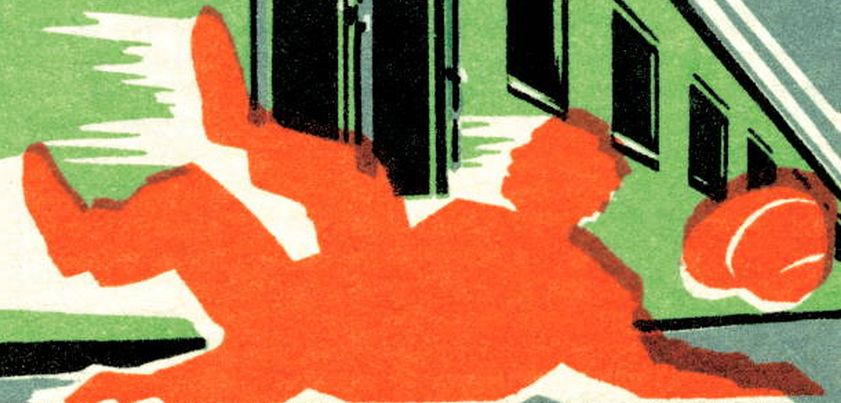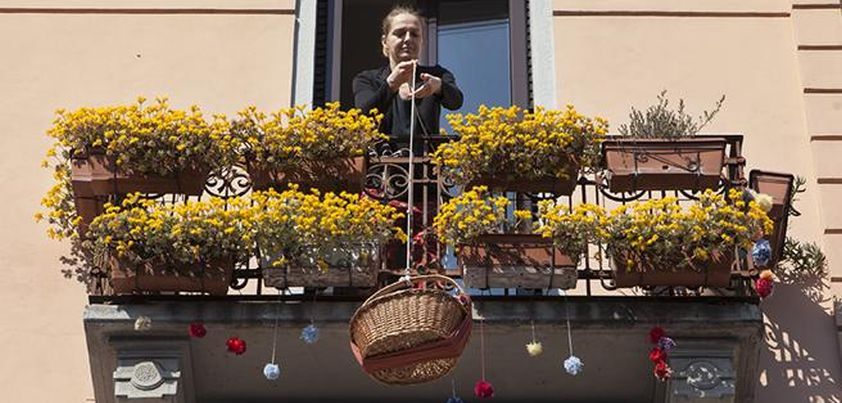 In this story by Luigi Pirandello, a “not old and yet no longer young” man is full of emptiness and despair following the death of his wife. In accordance with Italian tradition, his married son becomes “man of the house” and consigns him to a remodeled servant’s room in the courtyard. Alienated, he spends his days watching children play in a nearby park. A misunderstanding by a young girl when he bends to take off his shoes so he can feel the grass under his feet sends him home in misery. Themes include loss, grief, despair, aging, alienation/isolation, loneliness, relativism. More…
In this story by Luigi Pirandello, a “not old and yet no longer young” man is full of emptiness and despair following the death of his wife. In accordance with Italian tradition, his married son becomes “man of the house” and consigns him to a remodeled servant’s room in the courtyard. Alienated, he spends his days watching children play in a nearby park. A misunderstanding by a young girl when he bends to take off his shoes so he can feel the grass under his feet sends him home in misery. Themes include loss, grief, despair, aging, alienation/isolation, loneliness, relativism. More…
Archives
A Day Goes By
 First time readers of this narrative from Luigi Pirandello may find it confusing until the last few paragraphs. The story is an allegory of life, contracted into a single day. The day begins as the disoriented protagonist is unceremoniously cast out of a train carriage into the dawn, and ends with him lying on his deathbed surrounded by his children and grandchildren. Themes include alienation (not knowing oneself, lack of self-confidence, exclusion); identity (what makes us who we are – clothes, occupation, recognition, money, possessions, family); and time (the speed at which life appears to have passed as we age). More…
First time readers of this narrative from Luigi Pirandello may find it confusing until the last few paragraphs. The story is an allegory of life, contracted into a single day. The day begins as the disoriented protagonist is unceremoniously cast out of a train carriage into the dawn, and ends with him lying on his deathbed surrounded by his children and grandchildren. Themes include alienation (not knowing oneself, lack of self-confidence, exclusion); identity (what makes us who we are – clothes, occupation, recognition, money, possessions, family); and time (the speed at which life appears to have passed as we age). More…
The Wreath
 In this moving story by Luigi Pirandello, a middle-aged doctor is disturbed to learn that his much younger wife, who still has feelings for a former lover who died before they married, has gone behind his back and secretly ordered a wreath for the anniversary of his death. At first angry and ready to “take her back to her father’s house,” he calms down and finally accompanies her to the cemetery. Touched by his gesture, she looks at him as she had never looked at him before. Themes include the beauty of nature, love, mourning, deceit, understanding and compassion. More…
In this moving story by Luigi Pirandello, a middle-aged doctor is disturbed to learn that his much younger wife, who still has feelings for a former lover who died before they married, has gone behind his back and secretly ordered a wreath for the anniversary of his death. At first angry and ready to “take her back to her father’s house,” he calms down and finally accompanies her to the cemetery. Touched by his gesture, she looks at him as she had never looked at him before. Themes include the beauty of nature, love, mourning, deceit, understanding and compassion. More…
Mrs. Frola and Mr. Ponza, Her Son-in-Law
 In this story by Luigi Pirandello, a respected civil servant rents an apartment for himself and his wife, and another for his mother-in-law. Gossip rages when he doesn’t allow his wife to leave their apartment, or her mother to visit. He explains to a “ladies’ group” that his first wife (the mother-in-law’s daughter) is dead, and he is supporting her mother, who is crazy. The “mother-in-law” later argues that her son-in-law is the crazy one. Readers are left to decide which of the equally plausible stories is true. Themes include gossip vs. the right to privacy, judging by appearances, relativism. More…
In this story by Luigi Pirandello, a respected civil servant rents an apartment for himself and his wife, and another for his mother-in-law. Gossip rages when he doesn’t allow his wife to leave their apartment, or her mother to visit. He explains to a “ladies’ group” that his first wife (the mother-in-law’s daughter) is dead, and he is supporting her mother, who is crazy. The “mother-in-law” later argues that her son-in-law is the crazy one. Readers are left to decide which of the equally plausible stories is true. Themes include gossip vs. the right to privacy, judging by appearances, relativism. More…
A Horse in the Moon
 This story by Luigi Pirandello opens with a wedding feast in which guests are concerned for the innocent, vivacious Italian bride. Although wealthy, the Sicilian groom appears physically and mentally ill. After seeing the guests off, the groom tries to hurry his new wife inside. She objects and, while heading towards the nearby village, they come across a dying horse. On seeing his reaction, she realizes the marriage was a mistake. A medical episode and vision he has as the moon rises behind the horse solves the problem for her. Themes include naivety, marriage, madness, suffering, compassion, death, culture clash. More…
This story by Luigi Pirandello opens with a wedding feast in which guests are concerned for the innocent, vivacious Italian bride. Although wealthy, the Sicilian groom appears physically and mentally ill. After seeing the guests off, the groom tries to hurry his new wife inside. She objects and, while heading towards the nearby village, they come across a dying horse. On seeing his reaction, she realizes the marriage was a mistake. A medical episode and vision he has as the moon rises behind the horse solves the problem for her. Themes include naivety, marriage, madness, suffering, compassion, death, culture clash. More…
War
 If you are looking for an action-packed war story, this is not for you. Set in Italy during World War One, this story by Luigi Pirandello is a dialogue-packed discussion among the parents of men who are going or have gone off to war about its impact on their lives. The central themes are patriotism, duty, fear, sacrifice and grief. The climax comes when a man who claimed to be above grief because his son died honorably for his country breaks into tears when forced to confront the fact that the boy really is dead and gone forever. More…
If you are looking for an action-packed war story, this is not for you. Set in Italy during World War One, this story by Luigi Pirandello is a dialogue-packed discussion among the parents of men who are going or have gone off to war about its impact on their lives. The central themes are patriotism, duty, fear, sacrifice and grief. The climax comes when a man who claimed to be above grief because his son died honorably for his country breaks into tears when forced to confront the fact that the boy really is dead and gone forever. More…